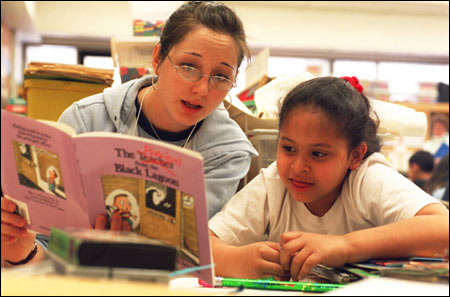‘Literary luncheons’ inspire Cambridge schoolchildren

Tuesdays mean a full house in Pat Goffredo’s second-grade classroom at the Amigos School in Cambridge. “I rarely have any absences on Tuesday,” says Goffredo. “Even if they have dentists’ appointments, they make it in.”
That’s because Tuesdays are Reading Buddies days, when volunteers from the Harvard Graduate School of Education (GSE) and beyond visit the Putnam Avenue school for one-on-one read-aloud sessions with the students there. For a half-hour in the middle of the day – lunch hour for the Harvard students and staff, literacy time for the Amigos students – Goffredo’s small classroom swells to twice its size and hums with excitement as volunteers spark a love of books with the second-graders.
On a recent Tuesday, the volunteer Buddies bear thrilling gifts: The GSE’s Office of School Partnerships, which oversees the program in partnership with the Cambridge School Volunteers, has just purchased nearly 100 new books selected especially for these students. As if on cue, Goffredo’s students break into spontaneous applause.
The books reflect the diverse interests unique to Goffredo’s second-graders: Mike Thaler’s “Black Lagoon” series, which plays on kids’ anxieties about going to school and encountering the unfamiliar, is a perennial favorite, as are nonfiction thrillers about sharks and snakes. One student can’t get enough of
To volunteer in Cambridge schools
tales about the Underground Railroad. And because the program is designed to boost literacy by having adults read aloud to students, the selections aren’t bound by the second-graders’ reading level. With the Harvard volunteers handling what is, for many of the second-graders, the heavy lifting of reading the words on the page, the Amigos students are free to concentrate on expanding their worlds and ideas with books.
‘He doesn’t miss a thing’
“The beginning of this story’s really different from the end of this story, isn’t it?” GSE student Anna Shane asks her buddy, Carlos Seiron. Shane has just finished reading Thaler’s “The Principal From the Black Lagoon,” in which the protagonist imagines the school principal as a dreaded ogre until he actually meets him.
“Do you know what a rumor is?” Shane asks Seiron as they wonder together why the character in the book thought the principal would be so frightening.
“Like a place in my house? A room?” asks Seiron. He and Shane riff on “room,” “rumor,” “bummer” as Shane explains the concept of a rumor.
In the opposite corner of the crowded classroom, Amigos student Alexis Bonilla-Guevara reviews another Thaler book, “The Gym Teacher From the Black Lagoon,” as his buddy, William Holinger, records his comments on their ongoing record of books read. “The gym teacher is not a green monster after all,” the second-grader summarizes.
Commenting on his experience with Reading Buddies, Bonilla-Guevara is equally concise: “They read stories to us and they’re fun,” he says, adding that he doesn’t read much on his own.
“It’s fascinating to me,” says Holinger of Bonilla-Guevara. “He seems to be distracted, but when I talk to him about the book, he hasn’t missed a thing.”
Modeling literacy
Holinger, who has volunteered as a Reading Buddy for the three years the program has been offered through the GSE, is one of a handful of administrators who participate. The director of Harvard Extension School’s secondary school program, he welcomes the opportunity to leave his workday behind – even briefly – to read to second-graders.
“I love books, I love literature, I love the books we read,” he says. “It’s just fun.”
Other volunteers echo Holinger’s comments. “I’ve always loved reading, and I think kids should start early and be encouraged to do it,” says GSE student Kate Nardin. “I like being part of that.”
For the volunteers from the GSE, many of them former teachers, Reading Buddies keeps them in touch with the classroom experience while they advance their studies, says Chandra Alexander, a GSE student who coordinates the Reading Buddies program with classmate Melinda Jaz. For others, such as Holinger, it’s a satisfying volunteer activity that returns big rewards for a relatively small commitment of time, “It’s not every day I walk into the room and people applaud,” says Holinger.
But it’s more than appreciative applause. After three years with three very different Buddies, Holinger has come to realize that the impact of the program extends long after the last page is turned.
“If you think of it from the child’s point of view, the fact that an adult comes into their classroom every other week just to read to them impresses on them something about the importance of reading,” he says. “It’s a very powerful incentive to them to learn to read.”




